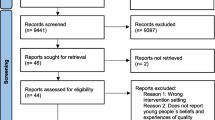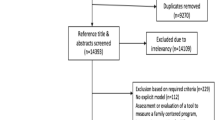Abstract
Few evidence-based methods for case management in child protection and child welfare are available. That is why Youth Protection Amsterdam Area developed a new method, by integrating their best practices: Intensive Family Case Management (IFCM). Because IFCM was developed in practice, clarity about its core elements and behavior acts was lacking. The purpose of this study was to establish a valid operationalization of IFCM used for implementation purposes such as training, clinical supervision and monitoring. A 74-item draft was developed to describe the behavioral acts of IFCM, based on a literature study and analysis of internal documents and training. To ensure content validity, a Delphi study was conducted. Over two rounds, professionals (1) rated the behavioral acts needed in the application of IFCM on a five-point Likert scale and (2) provided their preferred terminology. Items with consensus ratings of 80 % or more were included in the final description. Selected IFCM experts rated the behavior acts over two rounds. The initial list with 74 behavior acts was reduced to 55 acts with a consensus of 80 % or more. Certain behavior acts were combined, others did not lead to consensus. Based on experts’ feedback, the initial terminology of 46 behavior acts was modified. The final 55 acts were categorized in ten core elements. This study explicates the core elements of IFCM and describes the 55 necessary behavior acts in preferred and recognizable terminology. The study describes implications of these findings for the practice and gives recommendations for future research.

Similar content being viewed by others
Notes
For more information about Dutch Youth Protection Services see http://www.youthpolicy.nl or http://www.jeugdzorgnederland.nl.
For more information about Youth Protection Amsterdam Area see http://www.jbra.nl.
References
Alexander, J., & Parsons, B. V. (1982). Functional family therapy. Palo Alto: Brooks/Cole Publishing Company. doi:10.1037/11621-000.
Alexander, J. F., Waldron, H. B., Robbins, M. S., & Neeb, A. A. (2013). Functional family therapy for adolescent behavior problems. Washington, DC: American Psychological Association. doi:10.1037/14139-000.
Argyris, C. (2000). Teaching smart people how to learn. Strategic Learning in a Knowledge Economy, 279–295. doi:10.1016/b978-0-7506-7223-8.50015-0.
Beehler, G. P., Funderburk, J. S., Possemato, K., & Vair, C. L. (2013). Developing a measure of provider adherence to improve the implementation of behavioral health services in primary care: A Delphi study. Implementation Science, 8, 19. doi:10.1186/1748-5908-8-19.
Beidas, R. S., & Kendall, P. C. (2010). Training therapists in evidence-based practice: A critical review of studies from a system contextual perspective. Clinical Psychology: Science and Practice, 17, 1–30. doi:10.1111/j.1468-2850.2009.01187.x.
Blase, K., & Fixsen, D. (2013). Core intervention components: Identifying and operationalizing what makes programs work. ASPE Research Brief. US Department of Health and Human Services.
Coret, M., Felser, C., Schreel, A., & Grünwald, M. (2014). Weten hoe het werk werkt. De Vanguard methode voor managers. Alphen aan de Rijn: Vakmedianet.
Dinkgreve, M. A. H. M., Poel, S. F. P. van de, Coret, M., & Cahn, K. (2013). A systems approach toward leadership and the management of human services. Paper presented at Global Implementation Conference, Washington, USA.
Felser, C. (2011). In dienstverlening begint ontwerpen bij begrijpen. Management & Organisatie, 3, 17–35. Retrieved from http://www.vanguardnederland.nl.
Fixsen, D. L., Naoom, S. F., Blase, K. A., Friemand, R. M., & Wallace, F. (2005). Implementation research: A synthesis of the literature. Tampa, FL: University of South Florida, Louis de la Parte Florida Mental Health Institute, The National Implementation Research Network.
Goense, P. B., & Boendermaker, L. (submitted). Borging van interventies.
Henggeler, S. W., Schoenwald, S. K., Borduin, C. M., Rowland, M. D., & Cunningham, P. B. (2009). Multisystemic therapy for antisocial behavior in children and adolescents. New York: Guilford Press.
Hsu, C. C., & Sandford, B. A. (2007). The Delphi technique: Making sense of consensus. Practical Assessment, Research & Evaluation, 12(10), 1–8. doi:10.4135/9781412961288.n107.
Kalsbeek, A. (2008). Wat werkt bij multiprobleemgezinnen. Utrecht: Nederlands Jeugdinstituut. Retrieved from http://www.nji.nl.
Kamerman, S. B., & Kahn, A. J. (1990). Social services for children, youth and families in the United States. Children and Youth Services Review, 26, 1141–1154.
Kolehmainen, N., & Francis, J. J. (2012). Specifying content and mechanisms of change in interventions to change professionals’ practice: An illustration from the Good Goals study in occupational therapy. Implementation Science, 7(1), 100. doi:10.1186/1748-5908-7-100.
Kopp, D., & Medina, J. (2009). Functional Family Parole service. Internal document.
Lee, B. R., Ebesutani, C., Kolivoski, K. M., Becker, K. D., Lindsey, M. A., Brandt, N. E., et al. (2014). Program and practice elements for placement prevention: A review of interventions and their effectiveness in promoting home-based care. American Journal of Orthopsychiatry, 84(3), 244–256. doi:10.1037/h0099811.
Morrison, A. P., & Barratt, S. (2010). What are the components of cbt for psychosis? A Delphi study. Schizophrenia Bulletin, 36, 136–142. doi:10.1093/schbul/sbp118.
Movisie (2012). Op weg naar duurzame maatschappelijke ondersteuning. De inhoudelijke samenhang tussen de drie decentralisaties en de Wmo. Utrecht: Movisie. Retrieved from http://www.movisie.nl.
Rauta, S., Salanterä, S., Nivalainen, J., & Junttila, K. (2012). Validation of the core elements of perioperative nursing. Journal of Clinical Nursing, 22, 1391–1399. doi:10.1111/j.1365-2702.2012.04220.x.
Rhoades, B. L., Bumbarger, B. K., & Moore, J. E. (2012). The role of a state-level prevention support system in promoting high-quality implementation and sustainability of evidence-based programs. American Journal of Community Psychology, 50(3–4), 386–401. doi:10.1007/s10464-012-9502-1.
Rowland, M. K. (2009). Family-based reintegration: Effective interventions for juveniles on parole. El Paso: LFB Scholarly Publishing.
Seddon, J. (2008). Systems thinking in the public sector. Triarchy Press Limited.
Ungar, M., Liebenberg, L., Armstrong, M., Dudding, P., & Van de Vijver, F. J. R. (2013). Patterns of service use, individual and contextual risk factors, and resilience among adolescents using multiple psychosocial services. Child Abuse and Neglect, 37(2–3), 150–159. doi:10.1016/j.chiabu.2012.05.007.
Walker, J. S., & Bruns, E. J. (2006). Building on practice-based evidence: Using expert perspectives to define the wraparound process. Psychiatric Services, 57(11), 1579–1585. doi:10.1176/appi.ps.57.11.1579.
Wartna, J., Vaandrager, L., Wagemakers, A., & Koelen, M. (2012). Er is geen enkel werkzaam principe dat altijd werkt: een eerste verkenning van het begrip werkzame principes. Wageningen University, Leerstoelgroep Gezondheid en Maatschappij, Departement Maatschappijwetenschappen. Retrieved from http://www.wageningenur.nl.
Yousuf, M. I. (2007). Using experts’ opinions through Delphi technique. Practical Assessment, Research & Evaluation, 12(4), 1–8.
Zoon, M., & Berg-le Clercq, T. (2014). Wat werkt in multiprobleemgezinnen? Utrecht: Nederlands Jeugdinstituut.
Acknowledgments
We would like to thank the Stichting Pro Juventute Amsterdam (SPJA) for funding this research. The SPJA did not intervene with the research in design, data collection, analysis or interpretation, writing of the manuscript or the decision to submit the manuscript for publication. We also would like to thank all professionals of YPAA who voluntarily contributed to the Delphi study.
Conflict of interest
The authors declare that they have no competing interests.
Author information
Authors and Affiliations
Corresponding author
Rights and permissions
About this article
Cite this article
Busschers, I., Boendermaker, L. & Dinkgreve, M. Validation and Operationalization of Intensive Family Case Management: A Delphi Study. Child Adolesc Soc Work J 33, 69–78 (2016). https://doi.org/10.1007/s10560-015-0403-7
Published:
Issue Date:
DOI: https://doi.org/10.1007/s10560-015-0403-7




